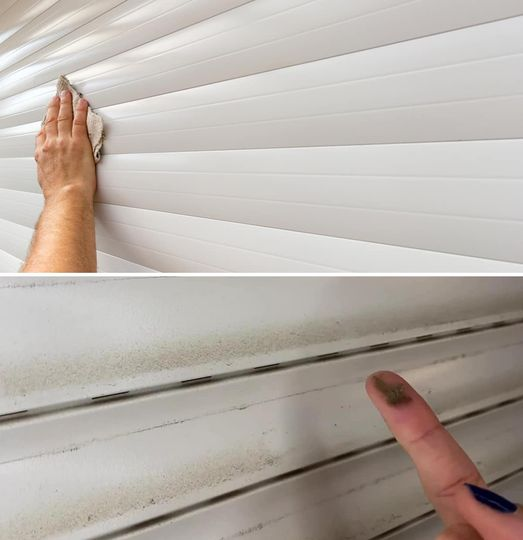ADVERTISEMENT
Specialized Cleaning for Different Materials
Wooden Shutters
- Use a slightly damp cloth instead of soaking the wood to avoid warping or cracking.
- Apply a wood-safe polish or oil to enhance the finish and protect against moisture.
Vinyl Shutters
- For an extra shine, mix white vinegar and water (1:3 ratio) and use it as a cleaning solution.
- Vinyl is more durable and can withstand scrubbing, but avoid using abrasive cleaners.
Metal Shutters
- Metal shutters are prone to rust if not maintained properly.
- Use a rust-resistant cleaner for any spots and ensure thorough drying to prevent future rusting.
Deep Cleaning Tips for Stubborn Stains
For stains or discoloration that regular cleaning can’t fix:- Baking Soda Paste: Mix baking soda with water to create a paste, apply it to the stain, and gently scrub with a brush.
- Vinegar Solution: For grease or grime, spray a mixture of vinegar and water, let it sit for a few minutes, then wipe clean.
- Commercial Cleaners: For tougher stains, use a cleaner specifically designed for the shutter material. Test it on a small area first.
Preventive Maintenance Tips
To keep your shutters looking like new, incorporate these habits:- Dust them weekly with a microfiber cloth or vacuum.
- Clean them thoroughly every few months.
- Inspect for damage, such as cracks or peeling paint, and address issues promptly.
- Repaint or refinish wooden shutters periodically to maintain their appearance.
Outdoor Shutters: Handling Weather Elements
Outdoor shutters endure harsh weather conditions, which can lead to fading, dirt buildup, and damage. Follow these extra steps:- UV Protection: Apply a UV-protective spray to prevent fading from sunlight.
- Rain and Dirt: Clean them more frequently during rainy seasons to avoid buildup.
- Regular Inspection: Check for mold, mildew, or algae growth, especially in humid climates. Use a mixture of bleach and water to remove these effectively.
How Often Should You Clean Shutters?
- Weekly: Dust shutters lightly to prevent buildup.
- Monthly: Perform a more thorough cleaning to maintain their appearance.
- Seasonally: Deep clean shutters, especially outdoor ones, at the change of seasons to address accumulated grime and weather damage.
Common Mistakes to Avoid
- Using Abrasive Materials: Rough sponges or brushes can scratch delicate surfaces.
- Over-Wetting Wooden Shutters: This can cause warping and damage.
- Skipping Drying: Leaving shutters wet can lead to water spots or even mold growth.
- Ignoring Maintenance: Small issues, like peeling paint or loose screws, can become major problems if not addressed promptly.
Benefits of Well-Maintained Shutters
- Increased Home Value: Clean, well-maintained shutters enhance curb appeal.
- Energy Efficiency: Functional shutters improve insulation and ventilation.
- Long-Term Savings: Regular care reduces the need for repairs or replacements.
Specialized Cleaning for Different Materials
Wooden Shutters
- Use a slightly damp cloth instead of soaking the wood to avoid warping or cracking.
- Apply a wood-safe polish or oil to enhance the finish and protect against moisture.
Vinyl Shutters
- For an extra shine, mix white vinegar and water (1:3 ratio) and use it as a cleaning solution.
- Vinyl is more durable and can withstand scrubbing, but avoid using abrasive cleaners.
Metal Shutters
- Metal shutters are prone to rust if not maintained properly.
- Use a rust-resistant cleaner for any spots and ensure thorough drying to prevent future rusting.
Deep Cleaning Tips for Stubborn Stains
For stains or discoloration that regular cleaning can’t fix:- Baking Soda Paste: Mix baking soda with water to create a paste, apply it to the stain, and gently scrub with a brush.
- Vinegar Solution: For grease or grime, spray a mixture of vinegar and water, let it sit for a few minutes, then wipe clean.
- Commercial Cleaners: For tougher stains, use a cleaner specifically designed for the shutter material. Test it on a small area first.
Preventive Maintenance Tips
To keep your shutters looking like new, incorporate these habits:- Dust them weekly with a microfiber cloth or vacuum.
- Clean them thoroughly every few months.
- Inspect for damage, such as cracks or peeling paint, and address issues promptly.
- Repaint or refinish wooden shutters periodically to maintain their appearance.
Outdoor Shutters: Handling Weather Elements
Outdoor shutters endure harsh weather conditions, which can lead to fading, dirt buildup, and damage. Follow these extra steps:- UV Protection: Apply a UV-protective spray to prevent fading from sunlight.
- Rain and Dirt: Clean them more frequently during rainy seasons to avoid buildup.
- Regular Inspection: Check for mold, mildew, or algae growth, especially in humid climates. Use a mixture of bleach and water to remove these effectively.
How Often Should You Clean Shutters?
- Weekly: Dust shutters lightly to prevent buildup.
- Monthly: Perform a more thorough cleaning to maintain their appearance.
- Seasonally: Deep clean shutters, especially outdoor ones, at the change of seasons to address accumulated grime and weather damage.
Common Mistakes to Avoid
- Using Abrasive Materials: Rough sponges or brushes can scratch delicate surfaces.
- Over-Wetting Wooden Shutters: This can cause warping and damage.
- Skipping Drying: Leaving shutters wet can lead to water spots or even mold growth.
- Ignoring Maintenance: Small issues, like peeling paint or loose screws, can become major problems if not addressed promptly.
Benefits of Well-Maintained Shutters
- Increased Home Value: Clean, well-maintained shutters enhance curb appeal.
- Energy Efficiency: Functional shutters improve insulation and ventilation.
- Long-Term Savings: Regular care reduces the need for repairs or replacements.
ADVERTISEMENT
